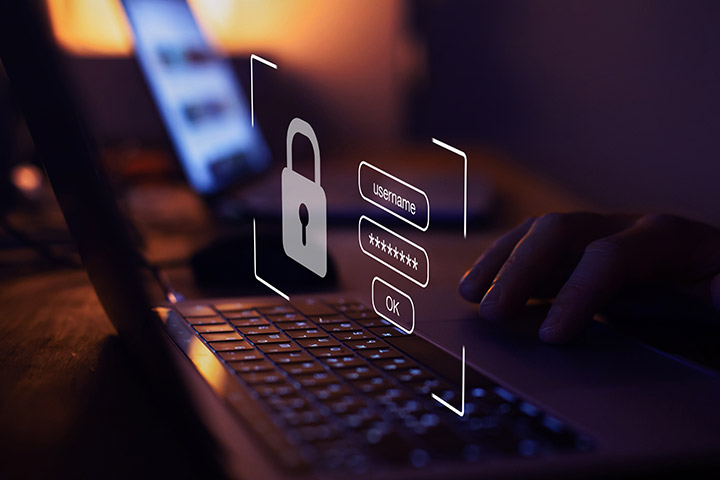Account Takeover Prevention

When someone gets a hold of your username/password combination, they can access your accounts, steal personal data, charge transactions in your name, and harm your credit. IDStrong’s account takeover prevention service protects customers from this type of fraud.
Threat researchers have discovered more than 1.7 billion clear text passwords and username combinations on the dark web. These credentials were stolen in various data breaches, harvested through botnets, and collected through keyloggers, malware, and credential stuffing attacks. If your information was stolen and is included in this database, you could be at risk of account takeover. Even unsophisticated hackers can use this information to gain unauthorized access to your accounts and commit fraud.
Once hackers gain access to your online accounts, they can access financial details like bank account numbers or stored credit cards. These criminals usually lock the user out of the account immediately by changing the password. Since many people reuse passwords on multiple accounts, it puts all their online services at risk.
IDStrong’s email/username/password monitoring service will scour the internet and dark web for your exposed information and alert you if your records show up.
Dangers That Threaten Your Credit

Account takeovers are not simply limited to financial accounts. Hackers often take over someone’s cell phone account (SIM Swapping), or gain access to a bank, credit card, and even crypto accounts to steal money as well as steal their Netflix account and sell it online. In addition, some hackers gain access to your eCommerce accounts and charge goods and services in your name.
If someone gains access to any of your accounts, it could provide them with the keys to take over additional services and accounts. The information contained in one may lead to others. If someone can hack into your email account, they can use it to validate your identity with specific logins and then take over more accounts. Breach of your email account may also let cybercriminals open new accounts in your name or change existing passwords. Email accounts have become a critical part of our online identity, and scammers can use them for various types of fraud.
You cannot do enough to protect your usernames and passwords. IDStrong’s account takeover prevention service is the solution.
How Can Account Takeover
Prevention Help Me?
IDStrong will monitor various pieces of information such as your email, username, passwords, and account details to see if they show up exposed online. When they do appear, IDStrong will send you a notification so you can take swift action to prevent any further damage to your identity.
IDStrong collects dark web information from private and public databases to help you identify possible exposure of your data. If your SSN is exposed online, we will alert you. It could help you avoid identity theft if it has not yet occurred. With our comprehensive package we will alert you if someone tries to open new accounts in your name so you can take steps to mitigate any damage. We can also detect hacked accounts and monitor your bank account numbers to see if they show up exposed on the dark web.
Our service provides early detection of account takeover fraud so you can quickly act and secure your accounts before cybercriminals do more damage. You can monitor as little or as much information as you choose.
Monitoring your email address, usernames, and passwords could mean the difference between financial losses and quick restoration of your online accounts.
Here is what IDStrong will monitor:
-
Bank Account Numbers
-
Credit Card Numbers
-
Social Security Number
-
Email Addresses
-
Usernames
-
Passwords
-
User Account Information
-
Name
How IDStrong Works
1. Monitor
We continuously monitor your personal and financial information, scouring the dark web for potential threats, active data breaches, and network element leaks.
2. Alert
If we locate your information somewhere in the dark recesses of the Internet, we will instantly notify you, alerting you to any information leaked, exposed, or breached.
3. Resolve
We won’t just alert you of the dangers; we’ll help you resolve them. Our identity protection experts are available 24/7 to help you take the necessary actions to restore your identity and get back to normalcy.
Our Benefits
Identity Monitoring
Our business is monitoring billions of records on the dark web. If we find anything about your information, we alert you to the risks and offer recovery strategies.
Credit Monitoring
One of the essential elements of your identity is that we monitor your credit profile for suspicious inquiries, new loans, or credit-related changes. That means no surprises when it’s time to put a down payment on your dream home or car.
Privacy Monitoring
Personal information is the lifeblood of data brokers. They collect and sell it on a massive scale, and when your data is harvested online and neatly parceled into their systems, we allow you to remove it with a click.
Up to $1 million Identity Theft Insurance *
If you are a victim of ID theft, we’ve got you covered. We will cover up to $1 million for theft recovery expenses. If the worst happens, that gives you peace of mind and a financial safety net.
Lost Wallet Assistance
We’ve got you covered, even if your wallet is lost or stolen. We’ll provide quick, reliable help navigating the world of data defense and structure the best recovery options for your situation. Our experts walk you through the process step-by-step.
Identity Restoration
If you experience identity theft, our expert fraud resolution team will deliver personalized support; we’ll investigate the situation, recover what we can, and restore your identity to its rightful status.
* The Identity Theft Insurance is underwritten and administered by American Bankers Insurance Company of Florida, an Assurant company.
Please refer to the actual policies for terms, conditions, and exclusions of coverage. Coverage may not be available in all jurisdictions. Review the Summary of Benefits.
Frequently Asked Questions
About Account Takeovers
What is an Account Takeover?
An account takeover (ATO) is when an identity thief impersonates you and takes control of one or more of your online accounts. These may include bank or credit card accounts, other financial, medical, or online services accounts. Identity thieves obtain your login credentials (username/password combos) through data breaches, phishing attacks, ransomware, spyware, and other acts of fraud.
What is Credential Stuffing, and How Can it Affect Me?
If even one of your username/password combos is stolen or breached, you may be at risk of credential stuffing (a type of brute force attack). Hackers don’t need to know which other accounts and services you have. They use automated software (bots) to try your stolen credentials on multiple accounts (credential stuffing) and can break into thousands of accounts within minutes. If you reuse passwords on more than one account, you are at risk of an account takeover attack.
What Type of Information is Needed to Take Over an Account?
Identity thieves only need a few pieces of personally identifiable information (PII) about you to perform an account takeover. They can use your date of birth, full name and address, email or phone accounts, SSN, or other critical information to pose as you and open, modify, take over, or benefit from your accounts in some other way. Some of this account information is stolen from your compromised accounts.
What Do Hackers Do with Stolen Accounts?
Once criminals gain access to your stolen accounts, they may do various things with them, such as:
- Use your rewards points to buy things or take advantage of discounts.
- Place orders or buy items.
- Open a new credit card in your name and make purchases.
- Purchase a new smartphone from your phone carrier and charge it to you.
- Drain your bank accounts.
- Commit credit card fraud.
- Send spam from your email account.
- Access other accounts using the information they found in another.
- Sell your information or accounts on the dark web.
- Redirect your unemployment or social security benefits to themselves.
- Access and steal other personal information or financial details.
What Should I Do If My Account Was Taken Over?
First, contact your bank or account issuer and let them know you are a victim of ATO fraud. Then, have them reset any passwords or logins and change the email address associated with your account. Next, contact the credit bureaus and put a credit freeze on your account so no one can open new lines of credit in your name. Finally, have credit cards, and banks also freeze the activity in your account until you have fixed the problem.
How to Protect Yourself from Account Takeover
Although account takeover is an alarming threat, you can take steps to protect yourself from these types of scams. Follow this list of tips to reduce your likelihood of an attack:
- Never reuse passwords on multiple accounts.
- Sign up for two-factor authentication whenever offered, especially with credit card and bank accounts.
- Never download apps you don’t know or trust.
- Always use long, strong passwords (a combination of letters, numbers, and symbols).
- Keep good, strong antivirus/anti-malware software running on all your devices as part of your cybersecurity practice.
- Turn on multi-factor authentication (biometrics) on your mobile devices.
- Keep a close eye on your credit report. You can get a free copy from all three bureaus each year. Consider credit monitoring and a credit freeze.
- Sign up for identity theft monitoring to keep a close eye on all your data and receive alerts when your information is exposed online.
Can Exposure of My Personal Details Lead to Account Takeover?
Yes, exposed personal details such as your name, DOB, phone number, email account, username, user ID, social media profiles, relatives, associates, employment, education, and other personally identifiable data may lead to an account takeover.
How Can Email/Password Monitoring Help Prevent an Account Takeover?
No monitoring service can prevent all account takeovers, but account takeover prevention monitoring will give you an advantage by checking, verifying, and identifying what types of personal information could be compromised by looking at recent accounts and inquiries and monitoring any changes to your credit score or available credit lines. It can also show you exposed email addresses, usernames, and passwords.
What Types of Accounts are Targets for a Takeover?
Any type of account you have online could be at risk of account takeover. Your financial accounts are targets, shopping accounts (like Amazon), Netflix or other streaming services, email accounts, and even social media. When you open them, most accounts require some personal information; therefore, they are all targets for cybercriminals.
What is Account Takeover Fraud?
Account takeover fraud is when someone gains illegal access to one or more of your accounts and uses them to commit fraud. It could include draining your bank accounts, making purchases in your name, or defrauding others using your email account.








